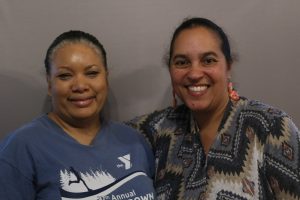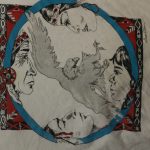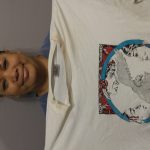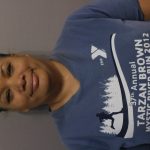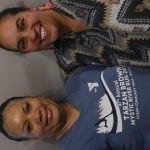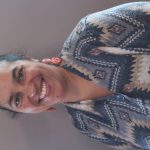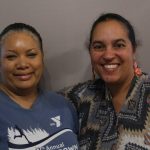Anna Brown-Jackson and Loren Spears
Description
Anna Brown-Jackson (48) is interviewed by Loren Spears (50) about her family's history as part of the Narragansett tribe. She remembers her grandfather Ellison "Tarzan" Brown and discusses her mother's career as an artist.Subject Log / Time Code
Participants
- Anna Brown-Jackson
- Loren Spears
Recording Locations
Tomaquag MuseumVenue / Recording Kit
Tier
Partnership
Partnership Type
Fee for ServiceKeywords
Subjects
Transcript
StoryCorps uses Google Cloud Speech-to-Text and Natural Language API to provide machine-generated transcripts. Transcripts have not been checked for accuracy and may contain errors. Learn more about our FAQs through our Help Center or do not hesitate to get in touch with us if you have any questions.
00:01 Loren Spears, I'm 50 years old. Today's date is November 13th. We are doing the storycorps at Tom aquatic Museum and I'm here with a tribal member friend cousin of mine.
00:20 Anna brown-jackson 48 years old. It's November 13th 2016. I'm at the Atomic Clock Museum with my cousin and friend Loren Spears.
00:38 So Anna, I know we were really excited to have you come because you're you have a very famous grandfather who for you. I'm sure it's just your grandfather. But for all the rest of us, we think he's just amazing and has done so much to bring visibility to our community. So I thought you might start by sharing some stories about your grandfather Ellison Tarzan Brown.
01:03 I do remember him as a child.
01:09 My dad is the youngest of the four children.
01:14 Allison was sunny Ethel was also known as fast Marlene and then my dad is Norman with everyone knows as Thunderbolt Thunderbolts daughter. I think as a child, I really had no idea about the magnitude of the man when I knew my grandfather he was
01:35 Not living in a mansion we had my grandparents had a shack it was you know how to do it floor in it. They didn't have running water. We had an outhouse, but the thing that we had there was love and a lot of good memories every day after school or even before we started school. We would go there and we eat and just they were very family-oriented him and my grandmother ASL Wilcox. I was very family-oriented and
02:07 I thought he was kind of important. I wasn't sure of what because he didn't really brag about it when we were around but in the summer it was we would spend a lot of time together. We would be at the pond. I would go with the guys because my mom and my granny had to be at work so they would watch us and we would be in the in the water. Just getting whatever Seafood we could get riding around in my car selling it will giving it to relatives and stopping at the stores and things like that. But I had no idea he was the athlete that he was he was chopping wood all the time. We had four fires in the yard all things like that. But it I thought it was weird that everyone knew him no matter where we went everyone knew him. So
02:58 I'd I think that was it was really amazing. And then as we got older we started learning more I know why it really broke my heart. I think I cried probably like the first two or three weeks when I had to start kindergarten because my phone was over so I remember that about him.
03:20 Oakland great stories and I'm wondering you know, you were talking about inside the house in in your Gathering seafood and things like that. I'm wondering if you want to tell a story about your grandmother or grandfather or parents in cooking the food but that's such a big part of our community, you know, the way that we eat together what kinds of things that we both of my grandparents. It seems like they always had that was not just one pot on the stove and I guess they were at the point and then marriage where he liked he would have spaghetti a lot everyday in this funny even all of the grandkids Loved Spaghetti, but we would come in the house and say grandpa. What kind of sausage is it today? It's like so this is a hot sauce are there was a spicy sauce. So today I wanted it more sweet and my grandmother would cook her regular dinner that she wanted to cook but it was like they had their pot never ran out. There was never
04:20 And if anyone pulled in the yard and said, you know. I'm already in they'd offer it that they were not stingy a greedy with food and I think that that still has passed on to all of our families even the grandchildren whatever we have we share and I've noticed that even in the tribal Community outside of our you know, an initial family here. I've noticed that in the extended family. I'm they're not stingy at all agree to whatever food they have. They'll share I will say I was more afraid of my grandmother then I was my grandfather because she
05:00 Was teaching us more rules and how to behave and if you didn't work you did not eat. So as long as you could walk and talk you would be in the yard Gathering something called qinling talk to a few older you would carry the logs for the fire. They had a wood stove. So if you didn't do that, you were not going to eat. I never saw any of the grandchildren say we're not going to get kenlan or we're not going to get lock. So nobody obviously had going hungry everyone cooperated with my grandmother. She was like 5 to but we were she had a mean left hook from what we heard. So we were not we didn't dare even test her I think grandkids never really test a grandparents. Only their parents. Yeah. Oh, yeah. Yeah. Yeah. What's a whole different bond with them? I think that's one of the things they really pushed is.
06:00 To stay together and to take care of one another things like that. So they will. They were very family-oriented. I think a lot of that too was with some of the
06:13 Different things that had going on in family some you lost loved ones through a different way. So what kind of bills a closeness after things like that in our community? Your grandfather is from a very large family. Yes. So many of us I married into and yeah and then on some other side cousins, yes that same family. So I think of my own husband side of the family and his grandparents, which is your grandfather's sister Grey's like in The NeverEnding pots of food Rino their own magical and how much food is bear. But I think our communities definitely showed our love through food and we might not have been rich in the the Western way of thinking of it, but we always had enough food to go around and with the hunting fishing and Gathering so I was thinking about
07:07 You know how all of that helps support our families, but maybe you even have a story or two from your family on kinds of jobs that besides the athletic work that your grandfather did spino in our families. We have a tradition of passing down certain kinds of jobs, and I'm wondering if you have anything to share about that. Maybe I think the main job would be the stonemason work and I've I've noticed that go on for centuries through
07:38 Does even work that still stands right now? I'm I work at a State University. But I also have a side job as a license CNA. I can't tell you the amount of times. I've gone into the home and I've looked at the fireplace and I'd say that I'm did the Browns build that and they say oh, yeah someone so built a sore. So you can kind of tell just by looking at the structure of the stone wall and then they'll go on to tell me, you know, it was Tarzan Brown and his two sons and they had a little boy with him. He was mixing cement or do you was doing this he was doing that that little boy is usually Ted Brown who is also 48 and I tease my dad and my uncle from time to time I say Ted is the best stone Mason in the tribe because he is done a lot of work over at Portsmouth Abbey. He did work out millionaires have flown them into Texas and other places to do the stone work. He showed me one buck.
08:38 A person that ordered Italian marble it was a beautiful black marble and he couldn't afford to make a mistake on it. My grandfather's work was more rustic but that is more of a perfectionist. So he wants everything just so so I think that that's been the main trade. My grandfather was kind of tough on all of us really he would say things to us. Like it wasn't just a guy's job you you had to know how to survive
09:12 You didn't have running water. You had an outhouse things like that. So we wouldn't go hunting with them, but he would you know, everyone had a part in another job and what they were doing if I
09:28 That's a good I was you I was one of the younger grandkids so I would be on the Camlin team usually picking up. Kenlan or or I would help my grandmother clock. She would show me how to do something. I was smaller and there were more boys so they would work more with my grandfather and I feel like in our community. This is very common. No matter where you are. We had a job to do. Yes. I remember when I was really really young like three my job was to sweep the stairs down, you know, and that was your job and you know, as I got older we had just wood stoves as well and the house that we lived in in Rockville. And if I was I was the only child my sister was 13 years younger than me when she was born. So it was my job as a teenager to go down into the basement and fill the big wood stove with wood in the morning. And then the one that we called the TV room which other people might have called the den.
10:28 With wood and so we all I think we all grew up in those family has to have you had you had to work as a team to get the jobs done in the masonry. You know, I mentioned Grace's line of which of course is the Steelers lions are there so many masons in our tribal immunity Browns and Spears's and Hazards and the list goes on there. So many that have done it and I think it's because all our family lines cross over so many different times that we're all related to each other in so many different ways and we have all these different conditions and your description of Teddy makes me think of my husband because that's how people describe him cuz he's so fussy and I must be why the two of them get along. Yeah. Yeah. I always had a small it was a kind of metal water.
11:21 Thing to carry we would go down to the or had to be a running spring and we would get the water and I had to carry that down and kept the container down and back they had a metal Ladle and you could you had a cop you could get your water out of and you didn't waste your water because there was no running water. So I even though I say to my kid, what are you doing turn off?
11:48 They don't know how ya know how hard it can be.
12:00 So I was thinking about your grandfather again in in just the amazing feats that he did in his lifetime and certainly being here, you know, I remember him but I was very much on the cursory in certainly at his older age and I didn't grow up with him in a way that I can remember stories of him specifically, but I think as a tribal member we're always so proud to talk about his legacy and you know the Feats of winning many many races and of course the Boston Marathon I thought maybe you should share a little bit about that from your perspective. He did win the Boston Marathon in 1936 and in 1939, what I didn't know is he had ran so many other times even years before that. He always is placed in the the top five numbers, but those are the two times that he want. It was selected for the US Olympic team in 1936. So he was there in Berlin Drive.
13:00 Any with Jesse Owens and some of the other ones at that time? There was one article I had read that I guess my grandfather got into a little of little bit of a rush with some of the people there. They said he was the first American. Till fight the Germans Before the War Began, but you know, I think he had ended up getting disqualified. He had a hernia was something he was also picked again in 1940 to go on the US Olympic team, but it was cancelled because of the war so they didn't send it to the Olympics. He was known for Heartbreak Hill Heartbreak Hill was at the Boston Marathon 26 and 1/2 miles, I believe but there's some section that kind of Hell a then it goes down then it goes up. It's called Newton Hills so as the story
14:00 As Told Tarzan, my grandfather was in the lead for most of the time they didn't know he had already taken off. So the photography photographers and everyone was following John Kelly because they only saw him take off. They didn't realize my grandfather was already in the lead and he had held the lead for a while. And then Johnny Kelly caught up to him and my grandfather was said he was just looking down at the pavement just running and running and running but Johnny Kelly kind of had him on his back as if to say nice job cat he was younger than a lot of the runners and I guess when he patted my grandfather on the back my grandfather kind of took off like a bolt of lightning. It was the only one there for Miles running and then someone pops up and passed them. So that would kind of spook you so after he took off then Johnny Kelly
15:00 They catching up to him and they had some kind of challenge back and forth on Newton Hills for a while until my grandfather finally took a large lead and ended up winning the marathon, but that saw this is the 80th year this year for Heartbreak Hill. So they said without John Kelly and Tarzan Brown. You wouldn't I had Heartbreak Hill.
15:25 And that was that was interesting thing. He's in the athletic American Indian Hall of Fame. And that was thanks to Billy Mills who they say they ended up being our friends and dumb.
15:41 We did meet him. This year was a nice privilege. We went to the Boston Marathon and they wanted to honor and recognize Native Americans contributions to running. A lot of times Indians were not depicted as good Runners, but it was a natural raw talent that came to them and um, I think the first first Native to win was Tom Longboat, so we met some of his grandkids at the Marathon this year was celebrating a hundred and twenty years, but a bad Boston Marathon and we we went to I looked at all of that and it was a nice nice experience even to see the marathon a young lady named Mickey wozencroft ran and honor of my grandfather and ironically
16:40 They are Grandparents were neighbors to my grandparents and they were all friends. So to see her come in at the Finish Line really it just gave me an incredible great feeling but you know, I just I just I wasn't all cuz even be there it was really emotional from Friday up to on Monday when we were there. It was a nice nice experience. So I know that they also have a tree planted in Westerly Wilcox Park and my grandfather's memory. I remember us going to that ceremony as a young kid. They also have a race in Mystic Connecticut. It's the 41st year this year. My grandfather used to donate a lot of time to the YMCA. He didn't have money to donate but when they had a fundraiser or something they would ask him for his help and he would run.
17:40 So they remembered him and they started after his death. They started the race. So every year we try to go there. I'm as a family as much as we can and it's just nice to be there. Some of us have shot off the starter's gun or now. It's a little horn instead of the gun. But I'm we've gone there and this year, I think even great-grandchildren little babies have come down to like five generations from my grandfather. So it was really nice. This was the first year that my grandmother his widow had not gone to she had died last year in October at the age of ninety six. So she was she was home surrounded by Family. She wanted to be home. So she didn't want to be in a nursing home. And so the grandkids took turns taking care of her nights weekends days so that she could be home and we she was worth it. She was
18:40 Really worth it. We don't regret it because she was always an excellent grandmother to us and
18:48 That without was our this was the first year she messed. So it was emotional on that level, but she wanted the race to continue and
18:58 And the race is really special to because it's special to you because it's your immediate family but in the tribal community and bustle because I know there's lots of tribal members that have gone and run that race just because it's the end for him. I know my brother-in-law van has run a few different times and I'm sure there's lots of others the Boston Marathon even for me was really special and emotional my mother Dawn and I we went up to celebrate because it was celebrating Tarzan Brown and the other native Runners as well and we were at the front end of that race and we got to wish Miss Mickey Mickey. Good luck. We got to wish Mickey. Good luck when I was heading off into the race and we got to film her going by with the masses of people in her cohort going off and it was just so amazing to see but more than anything is to actually see sort of the portion of the race and just the author of 26 mile.
19:59 I mean just to complete it is an amazing thing and then two women is just beyond almost comprehension but one of the things from sort of a museum or a historical contacts that I always think is so empowering is that Max Scott? Who is Wanda Hopkins son and Evangeline hankinson's grandson. He's a PhD candidate or when he was doing this work. He was a PhD candidate and he did a lot of studies on the Indian reorganization Act of 1934. And he was looking at the impacts of people on that to create this visibility since the Narragansett tribe had bendy tribalize even though it was illegal and it took a hundred years for us to prove that there was this. Of time from the 1880s to the 1980s a hundred years that we were kind of invisible in our own Homeland and he did such amazing research about how people like your grandfather Ellison Tarzan.
20:59 Put us on the map beat us visible in a time when we were being written out of the history books a time when we were being discredited as not being indigenous Indian, whatever term people want to call us Native American and hear your grandfather was putting us not on just a local stage but on a regional National and international stage and that just it gives me goosebumps to think about that cuz he probably wasn't aware of what he's doing cuz usually when people are doing things like that. They're not aware of it. But yet they make such an impact it reverberates for years and years after it helped us probably get Federal recognition. It helps us do all the things that we're doing now because of people like you are grandfather. It's just so awe-inspiring. Yeah why I was thinking of that also a lot of times I would have met him
21:59 Grandmother talking cuz I was like, okay if if he accomplished all of us, are you still in the shack and he doesn't have running water and you know when that didn't matter that was grandparents home, but he was saying to us, you know, when we will little he said you have to realize we were living at a time. He's that I don't care how many marathons I ran out there or what race is. He had one at one time or race in New York? And then the next day he came back in one another marathon in New Hampshire. He said I don't think it was all within a 24-hour. They said no one else had done that lot of time see what it's like to the races because he was very poor. But he said you have to realize this is at a time when indianwood being treated very badly and their own land and they wanted the Indians are in Rhode Island and leave the Narragansett to be extinct box.
22:59 When we were first born we knew we were Narragansett we know who our family was we knew where we had come from my grandparents and Silva and all of us. That was very important that we know and so you you you knew there was no doubt in your mind, even if they told you they what you are not Indian you were Indian, but it was they told us sometimes he would ask ahead of time what they gifto price would be if it was money or something else or a car. He would come in second or third and purpose to win that prize instead of winning. He said a trophy is not going to feed my family by then. He had forehead for kids no matter what he had accomplished when he came back home to Rhode Island. The Indian could still not get a job. And that's very sad during that time. That you what you were talking about pot.
23:59 But back then so I I did look at that and a lot of times I said why when we got there in the room this year of the Boston Marathon, they were people from all over the world marathon runners throughout all the history of the marathon and they were just coming up to us and hugging us and some remembered our grandfather. We met a lot of people from the Boston Athletic Association.
24:28 Bubba blah and I was like, wow when it was just that was I I I you don't realize something until you're there and you can start seeing I think my biggest regret is I wish that my grandfather was there to get the recognition and things that he deserved and but at the same time it was a kind of Bittersweet memory. We had Mickey wozencroft run for him and his memory and and the grandkids were able to go there and say that so it was a nice privilege.
25:05 And it's such an honor that you know does not like that Legacy that he has and
25:12 What do they say hindsight's 20/20 we can all see the big picture later. It's it's just amazing what he accomplished in his own life. And in the impact that he has on all of us as Narragansett p.m. And maybe indigenous people as well admit. There was some other native Runners this year at the Boston Marathon. And as soon as we walked in the room, they were like all ye citizens grandkids on they were from all the tribes tribes out west and all over from the four corners of the Earth, but they knew who we were and we just hug them. We didn't know them. That was the first time that we had Matt but their children wear running in the race in the mattress. I'm not just a regular a sandwich like always
25:55 Even if you don't if you're finished the marathon that in itself says something in and the Native Americans were represented at one of the higher points this year. So I think even as a child my grandfather sometimes was known for his Antics are doing different things, but he brought attention to what we was still all the time, but he would he would have like a fire when the yard each night and sometimes the police he would rake the leaves are clean. The yard of police would come and say it Tarzan. You can't have a fire. He said an Indian can always have a fire. This is medicine.
26:37 So we didn't say anything. We just kind of watch sometimes but my grandfather would tell all of the grandkids. You have to be your own person. You have to be your own person. You have to stand up for what is right. I remember going on different Lots with him and the other grandkids do to where he would cut down on Indian Path PE was born and raised here and then all of a sudden people started buying up property and then it was like a fence. Okay, you can't cross here to get he said they call the police on a home and we go down the path and they say you can't come here. This is private property. He said this is always been an Indian right of way here. I can go here. I'm getting food for my family and a lot of times the police would let him or the they would talk it out. Somehow. But when the police came they would say, oh don't you know who this is or blah blah blah I need
27:37 Brown and get you know the food or the seafood or whatever he was getting out of the ocean. So I think that that's kind of in all of us to you have to be your own person. You have to stand up for what you think is right things like that.
27:57 Important. Yeah
28:01 Do we want a Segway to your mom for a minute? Sure, cuz I know we wanted to make sure that we why don't you make sure you say what her name is and sort of maybe her parents even so that we can make some connection.
28:13 My mom is Sharon Alexander. Her mom actually is also a member of the Narragansett tribe and she grew up across the street from my grandparents at fall in Tarzan. She used to babysit my dad and his younger siblings. So then when he was bored, I when she was born and you know, they were older and they had had children and everything. I I'm the oldest of the two. I had it I had a younger brother who is deceased now, but
28:52 My mom ever since she was a young girl. My grandmother said my grandmother all of no said she was an artist. She had one art exhibits at school. She grow up in the South Kingstown South County area in Charlestown school system and she did art exhibits like why do leaves change colors and she had so many awards and saying she was the first person to design the Chariho mascot, which was a charger.
29:24 The horse so not the car that was so she designed that and she want to know water and everything for that but her artistic abilities kept. You know, she continued to draw ruin everything in paint but even as a young girl my brother and I would go with my mom to art exhibits at the college's is all the different galleries that around the state and some even out of state. And once again we were poor so a lot of times if she sold a painting or someone like to arrive at work, they would buy it right off of the wall and we knew that if they bought that my mother was going to treat my brother and I to something we didn't know what but she would say if I can sell such-and-such I can get you kids such and such so
30:17 If she did do that, but another tragedy that happened on my believe it was like a 1990 my mom's youngest brother had died in a kind of tragic accident. And at that time we were trying to kind of stay around my grandmother to keep her a busy and occupied. That was my grandmother's baby. My grandfather's baby. He was in his twenties, but that's still their baby and what had happened we had kind of thought of like a family healing Circle where we would just initially talking every night when we after the funeral and everything, we would talk and stuff like that, but then we started doing
31:07 Bead workout with leather work stuff like that and my mom would start painting on my grandmother would start writing things down in painting and it ended up somehow into American Indian Stone Art where we were spending days at the ocean at the beach and then we would get these rocks and my mother would hold it up to my grandmother or vice versa when she'd say, what do you see in that stone and a lot of times that they would see things that average person would not see in the stone but with a different
31:43 Layers and levels of the stone you could say. Okay. This is this looks like such and such and this is a warrior Chief or this is are there was one of Mother Earth cries for her children. It showed my mom painted a beautiful picture of a woman over top of all of her children. Just trying to gather them and protect them. So that one was called Mother Earth cries for her children, but I think the most unique stone was one that we found and it was double sided and look so ugly in the beginning but once she finished that it was a beautiful fish. I know she tried to get our work into the Smithsonian Institute. I can't remember what happened or if you follow through with that or not, but a lot of our work is on exhibit through all of Rhode Island or people even bought or a Stones Some People's fireplaces that they all I want to get that one.
32:43 Come over and we're going to put that in and they did so it was a nice nice out of something tragic something good came up while it's a nonprofit organization. But at the same time at it was a nice experience.
33:03 And I've seen some of her Stones because we partnered with the Hera Gallery last year and your mom put some of them in there absolutely stunning the audio that were saying you can't even give them Justice to how beautiful they look in the layers of the the painting and in the depth of the the imagery in it. It's absolutely stunning and I was showing the lady say what they want say, of course because it's an audio video but some of the artwork my mama done was for different posters and things so she had a circle of life and then it in the circle that had from a young girl into a woman and then a young man into a chief
33:49 And what's she just been really a nice experience? I'm not artistic at all. But I've always supported it.
34:01 Boohoo
34:08 We think there's so much I'd like to say and I don't even want to go down that road. I would get to emotional things but I am very proud of her. I'm also proud of my father both of them.
34:23 I know they didn't have the easiest circumstances growing up as tribal people on the reservation, but we always felt that we had love we were always fed and dumb.
34:38 They just sometimes they were not afraid to think out-of-the-box or do something out of the box like the width they are or anything else. So I am proud of her and I'm proud of my dad.
34:53 Is there anything and of that you want to share about yourself in your children may be?
34:59 I have two sons 21 and 25 Myers is my youngest son. He's 21 and my oldest son is Allen is 25i the same thing as my grandparents told me on my parents cuz I was I was close with all of my grandparents a lot of times if we would go there to visit them or something like that you end up talking and things like that and you ask them that's very important Elders. We're always an important part of our culture and I have tried to instill that in my children.
35:43 Both of them and just to try to be good people. I think a lot of times though when they got older they'd say you say all these old fashioned saying so that's the old fashioned ways of like, you know, what it work for my grandparents. It's going to work for us cuz I would say okay if you don't work, you don't eat everyone has a choice or everyone's going to pitch and you know what I mean on and be thankful for not so much what you have but who you have my try to emphasize that to them, you know what I mean and dumb
36:24 Ice weather 21 and 25 now. I think they're getting it a little more than they did in their teen years, but it at the end so it's been interesting. I did I love being a mom. I have two nieces also and so my brothers two daughters so that that like 24 and 26. So I've considered that my children especially with my brother being deceased. They're not my kids, but they are explain the same things to them and our family is important family is important a lot of times. We're so busy when my kids come home. I will tell them put the phone down when I'm talking to you. I want you to look me right in the face and we're going to have a conversation. You know what I mean? I have four little great-nephews they range from a newborn my two nieces are moms from a newborn up to 7 years old.
37:24 So I try to stay an active part of their life, but a couple of weeks ago. My nephew said can we play a game on T & R I said yeah, we're going to play a game. So that's thinking a video game. So I pull out this huge board game called Chutes and Ladders. They said now what are we doing? I said we're going to sit down as a family at the table and we're going to play Chutes and Ladders then we played Candy Land. They had the most fun. We just sat there and talked and we laughed I said, it's the modern technology age. It's very nice. But at the same time you have to have the one-on-one with each other and you have to be able to relate and things so everything's not computers or video games or cell phones. So yeah, so why I said we were going to talk with each other, you know what I mean? And that's what we did. So I am I I love the kids half to death. Like I said,
38:24 My brother is not here, but I'm the grandmother. You know what I mean know. I'm the greater. And actually they call me auntie mom, which I didn't tell them to do. But I said if your mom and dad cannot help you you call me. I will be there on the spot and that's how I feel and I know that they know that
38:49 So I need last things that you might want to share. Was there anything else that you didn't get a chance to that you might want to say now.
38:57 I think as far as
39:00 The Tarzan Brown situation with my grandfather and him passing away and my grandmother passing away last year. I would like to see maybe even the tribe have a rec center Warren athletic kind of thing. Our kids need other things to keep them busy a lot of our kids work. But you know what? I have a after-school program or something. They can go to a lot of them cannot right now. We're in a rural area and you don't have money to join these programs. I'd love to see you at eyes and brown Community Center with a pool and you know the whole nine yards for them to go after school. You do your homework, then you can go play ball or you can jog a do a couple of laps. Will you can go swimming? I would love to see that now that's my dream. But now that we're going to have to do that to that and my oldest and my oldest
40:00 I was saying the same thing he wanted to see something with my grandfather's name on it on the reservation like an athletic compound or something. I think we owe at least that much to watch kids.
